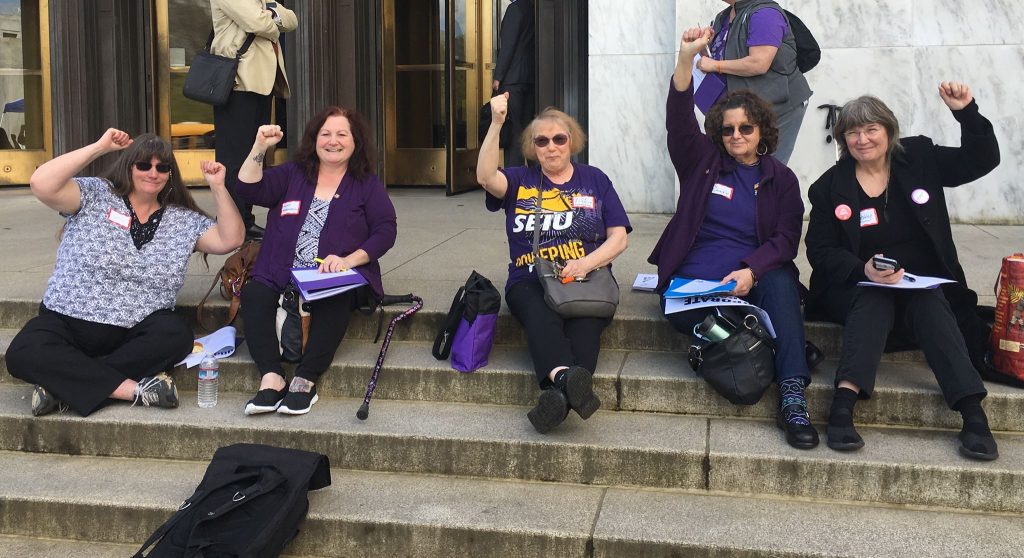For a “short” session, the Oregon Legislature made a lot of changes that will impact SEIU members at state agencies and public universities. Here’s a run down of what you need to know as the legislature adjourns until 2019.
Quick summary:
- SEIU members held the line on healthcare and retirement benefits.
- Legislators failed to fix the double coverage cut.
- New legislation will give members flexibility in how retirement funds are invested.
- DHS received additional funding to improve child welfare services.
- The background check unit will receive additional funding to hire more staff and reduce delays.
- Legislators passed a bill to require transparency in drug pricing, which will help manage cost increases in the public employee health plan.
- The Office of Child Care in the Early Learning Division will receive funding for additional positions to address safety and quality issues in child care, as well as funding for lead testing.
- Legislators passed a bill creating a pilot program that will allow anonymous whistleblowing in several state agencies. The bill also creates uniform whistleblowing training for all supervisors and employees.
More details below …

SEIU members rest after a long day of lobbying legislators at the State Capitol
Benefits Defense
At the beginning of session we saw a wave of politically-motivated attacks on our retirement and healthcare led by Representatives Julie Parrish and Mike Nearman — including two bills that would have eliminated pensions moving forward. We are pleased to report that all of these attacks were defeated.
Governor Brown’s PERS task force also made a list of recommendations to the legislature in advance of the session. The proposals focused on paying down the pension system’s debt without reducing the benefits workers receive. The legislature adopted one proposal that incentivizes schools and other public employers to make one-time payments to reduce their debt. This is not a full solution, but Governor Brown’s proposals are a productive change to the usual PERS conversation, which for years has centered around reducing benefits. We look forward to working with leadership in the legislature and in the Governor’s office to find more innovative ways of paying down the debt without taking money out of workers’ pockets.
On healthcare, legislators floated a misguided plan at the end of last session to merge the Public Employee Benefits Board — which manages SEIU members’ healthcare plans — with another board that manages teachers’ plans. Our members voices would have been diluted and the merger itself wouldn’t have brought any additional cost savings or efficiencies. SEIU PEBB representatives Shaun Parkman and Siobhan Martin pushed back. We succeeded in defeating the merger, while still putting forward a plan for PEBB and OEBB to work together to reduce costs. The resulting Innovation Subgroup will be able to do this important work without SEIU members losing their strong voice on their healthcare benefits.
Double Coverage
In 2017, in the last days of session, the legislature removed a long-standing healthcare benefit known as “double coverage.” This cut could lead to higher out-of-pocket costs for families with more than one public employee if we don’t take action before it goes into effect in 2020.
On February 14, a coalition of public worker union members, including members of SEIU 503, united in Salem to testify in support of a bill that would grandfather in current workers and protect this benefit for children moving forward. Unfortunately, the legislation was not passed before the end of session. However, our work in this session raised the profile of this issue and put us in a strong position to address it during the 2019 session or in bargaining next year.
If you or someone you know will be impacted by the loss of double coverage, click here share your story. Your stories are critical to the campaign to protect double coverage.
PERS Choice Bill
We passed a bill this session that will give SEIU members a little discretion in how the individual account portion of our retirement money is invested. Previously, there had been a one-size-fits-all approach to the state’s investment strategy. In good economic times, this provided a high rate of return. However in bad times, this approach exposed workers to volatility. For workers near retirement, who typically want less risky investment plans, it created real problems.
Beginning January 1, 2018, the Treasurer’s office switched to a target date fund model that adjusts the investment strategy over time, automatically. As a worker nears an expected retirement age of 65 years old, their risk is reduced. The change will better match a participants risk exposure and age.
In an environment where our retirement plans a highly politicized, passing an innovative improvement to benefits is a big deal.
Child Welfare Funding
On the heels of the child welfare audit released earlier this year, Governor Brown and legislators boosted funding to DHS by $15 million. These additional funds will go to hiring 185 caseworkers and case aides in order to begin to reduce chronic understaffing. Additionally, the legislature approved a small pot of money to support foster families with respite care, mentoring, and a flexible fund account for things like car seats, fire extinguishers, and diapers.
SEIU members have been pushing for new hires for years. Last week, members Rosanne Scott and Kelly Paluso went on OPB to discuss the issue. They made it clear that while this is a great start, we still need to do more to fully comply with the recommendations in the audit, which calls for 700 new caseworkers and additional funding for foster parent recruitment and retention. Our union will keep pushing until the state’s child welfare crisis is addressed.

SEIU members Rosanne Scott and Kelly Paluso in the OPB studio
Background Check Unit
State background checks can take weeks, leading to delays that impact SEIU members at DHS and other agencies, in addition to many SEIU care provider members. This session, our union put pressure on the legislature to do something. Lawmakers in Salem listened.
This year the background check unit will receive additional funding to fully staff the department. The goal is to hire enough staff to reduce turnaround on simple background checks to 24 – 48 hours, with more complicated checks taking 7 – 10 business days. It will take a while to get caught up and hit these benchmarks, but we are on our way.
Rx Price Transparency
Legislators also passed a drug price transparency bill. This legislation will require drug companies to report their profits, marketing costs, and whether there are generic alternatives available when they want to make a steep increase. Unfortunately, the final version of the bill that was passed is not as strong as we have seen in other states like California and Utah, however it is a start.
Pharmaceutical drug prices go up every year. In some cases, like insulin, prices have increased by 300 percent. This presents a major problem for PEBB. The legislature has imposed a 3.4 percent cap on PEBB cost increases. So when a drug price goes up by 300 percent, it becomes extremely difficult for us to keep costs under the cap. Transparency is an important piece to help bring down drug prices and improve our ability to effectively manage public employee healthcare costs.
